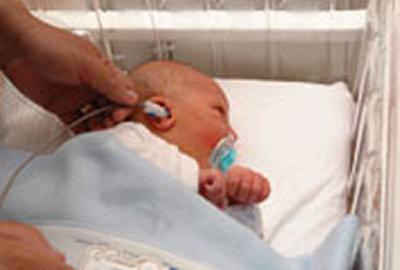
Researchers at the University of Southampton, Evelina Children's Hospital, London and the University of Liverpool in conjunction with a team at the National Perinatal Epidemiology Unit at Oxford have been awarded a grant by the National Institute for Health Research (NIHR) Health Technology Assessment programme to investigate whether routine use of antacid medications reduces the severity and incident of anastomotic stricture in children born with oesophageal atresia (OA).
Oesophageal atresia is a condition where the oesophagus or swallowing tube has not formed properly, and children born with this condition require surgery to correct the problem. This is typically done within the first few days of life. After this anything up to about half of children are troubled by a narrowing at the join in the oesophagus called a stricture. This usually requires a further procedure (and often more than one procedure) to treat this problem. Children born with OA often suffer a legacy of other feeding and breathing issues, which fortunately (though not in every case) tend to become less problematic as the child grows.
Some surgeons routinely use antacid type medications in these children believing that they will reduce the chance of a stricture occurring, or reduce its severity. At present there is no evidence to confirm that this is actually beneficial. In fact there is some suggestion that taking this sort of medicine may increase the chance of a stricture and also a risk of certain types of infection.
In the planned study called a randomised controlled trial, researchers will compare two groups of children born with oesophageal atresia. One group will be given antacid medication routinely and the other group will receive a placebo medication instead. Researchers will compare how many children in each group develop a stricture and how many procedures to treat the stricture each child needs. They will also evaluate other important outcomes for these children, such as growth.
The trial is expected to be large, going on for several years, with most OA babies who have been operated upon at most of the UK's (roughly 30) specialised paediatric surgical hospitals offered the opportunity to participate.
The study team believes that no large scale trial has yet been done anywhere in the World on this subject. Moreover by using the "gold standard" randomised controlled approach, the planned study should produce results that will be fully credible.
The trial will be preceded by a year-long feasibility phase during which the research team will consult with parents of children born with oesophageal atresia and healthcare professionals who look after these children. The team hope that they will be able to refine the plans for the trial during this feasibility phase to ensure that the study is designed in a way that is as acceptable as possible to both parents and healthcare professionals thereby maximising the chances of success.
Nigel Hall, co-chief investigator from the University of Southampton said, "This is an exciting time for research in children with oesophageal atresia since this is one of the first randomised controlled trials that has become available intended ultimately to help children born with this condition. We hope to be able to find out whether this type of medication is actually beneficial to children born with oesophageal atresia. If it is beneficial then we can justifiably give it to all babies during their early lives knowing that it is doing some good. If, however we find that it is not beneficial then we can avoid asking parents to give this medicine to their children and we can reduce the potential side effects from unnecessarily taking this medication."
This study is supported by TOFS, the support group for people born with oesophageal atresia and their families. John Pearce (representative of TOFS, who is part of the study team) said "We expect that this study will - in time - lead to a real step forward in knowing how best to treat OA babies. We are delighted to be supporting this study and offer children born with oesophageal atresia and their families the opportunity to take part in this important research".






